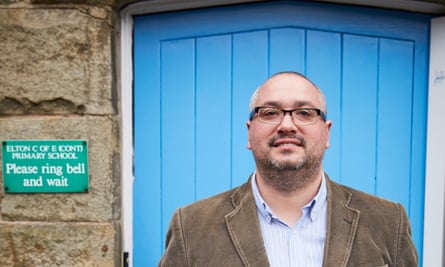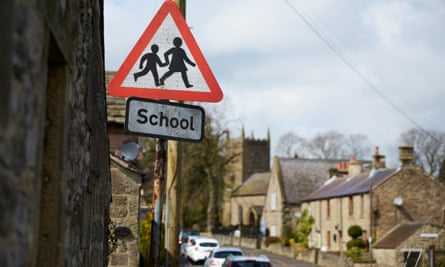Sarah Jones could, according to the recent history of education policy, be described as a model parent. She thought long and hard about what sort of school would be best for her eldest child, then moved halfway across the country to find it.
The tiny rural school in the picturesque village of Elton, in the Derbyshire Dales, is in stark contrast to the four-form-entry primary school she left behind on the south coast. It is also the school to which she and her mother went, and five-year-old Alfie has blossomed since he joined his infant class of seven children, which includes reception and years 1 and 2, in a school that educates only 19 children in total.
“He has gone from being anxious and unhappy in a school where we could barely see the teacher, to being excited every day,” says Jones. “He can barely wait to get out of the door.”
But Elton Church of England primary school, and hundreds like it, has found itself in the eye of a political storm over the direction of education policy. The risks to small rural schools from the government’s plans to force all schools to become academies have alarmed Tory backbenchers and their constituents.
Housed in its original 19th-century building, partly converted from the old schoolteacher’s house, Elton school fits the stereotypical image of the idyllic village primary. Its pupils are educated in two classrooms and assemblies are held in what was once the Victorian headteacher’s front room.
The school doubles up as the post office and is the heart of many village activities. It provides what parent governor Natalie Cooper describes as a lovely childhood with the sort of class sizes more usually found in the private sector.
Jones, Cooper and their friend Katherine Baker are determined that their school should stay as it is. They have a simple message for the education secretary, Nicky Morgan: “Leave us alone.”
“We moved here for the school too,” says Baker. “And I feel we are incredibly lucky. We have got a lot invested in this school and would do whatever we can to save it.”

The academies white paper doesn’t specifically target small schools, but the requirement that all schools should join multi-academy trusts, recently described by senior Conservative backbencher Graham Brady as “new and distant bureaucracies”, has led to fears that this model of rural education will become unviable and unattractive to the sort of trusts favoured by the government.
“People in the village are aware of what is proposed and there is uneasiness about what is going to happen,” says Cooper. “I am trying not to read the stories about this in the paper. I just turn the page. It is so personal and close to our hearts. It isn’t just us who would be absolutely mortified if the school had to close or change, it is the children. They would be devastated, and that is not over-egging it.”
There are more than 2,000 schools in England with fewer than 100 pupils. They tend to be in rural areas and, while often successful, can be seen as expensive. At Elton there are two teachers, one of whom is the head, Paul Hunter; an admin officer; teaching and learning assistants; and midday meals supervisors.
Money is tight and Hunter, along with neighbouring small school heads with whom he works closely, are upfront about the pressures of juggling the same paperwork, bureaucracy and overheads as every other school while also being class teachers. They are equally dedicated to their choice of career.
“I didn’t want to stop being a teacher,” says Hunter. “And in a school like this you get to know absolutely everything about the children and their families. We build incredible relationships.”

Like many other small Church of England schools, Elton is voluntary controlled so comes firmly within the local authority orbit and also gets support from the local diocese, which sustains its religious ethos. Hunter is positive about the importance of their relationship with the county council, whose role in education the government seems determined to eradicate.
“Our local authority has worked hard to help small rural schools so the worry is that the support will disappear and that we won’t be attractive to a multi-academy trust,” says Hunter. “The risk for a village like this is that without a school it becomes a museum piece with a part-time population. Families with children won’t want to live here. The risk is you end up with a two-tier system with schools no one wants.”
Derbyshire county council currently delegates budgets to schools to reflect the specific local, rural characteristics, so academisation isn’t the only worry on the horizon. Plans announced before Easter for a national funding formula might also cut budgets. In Derbyshire, the ability to expand numbers is limited by the planning restrictions of being in a national park.
For Paul Wilde, headteacher of neighbouring South Darley C of E primary school, which, with 58 pupils, is almost a giant by comparison, the concern is also about ethos and values. “Our worry is that a multi-academy trust would want to create a brand, with all schools the same,” he says. “My school is offering children an outstanding education that meets the needs of all our children and of our local community. We have the freedoms to do that, and context is everything. Why do we need to change?
“To me this is about much more than academisation; it is about the philosophy of education and about community – what is it for and who is it for?”

The heads are also indignant about what they perceive as Whitehall’s failure to understand that local context. “The DfE describes small schools as being around 200 pupils,” says Sharon Slack, head at nearby Winster C of E primary, which educates 34 pupils. “We see schools with 100 pupils as large schools. I don’t think the DfE has any idea of what goes on outside London.”
In the past few weeks, the government has sent out mixed messages about how much it is prepared to compromise, on the one hand sticking firmly to the commitments in the white paper, on the other briefing that there might be some funding concessions for schools in sparsely populated areas.
In a recent interview, Morgan said rural primaries were vital for “village life” and that she wanted them to keep their “character, independence and values”.
A DfE spokeswoman told the Guardian: “It is completely incorrect to suggest small schools will suffer as all schools become academies. A system led by multi-academy trusts where schools of all sizes can share resources, staff and expertise will in many cases provide better support to small schools.
“Many rural schools have been underfunded for years through a system that is unfair and out of date. No child should be disadvantaged because of where they live, and we are taking proactive steps to deal with the unique issues rural schools face. The introduction of a national funding formula is the biggest step towards fairer funding in over a decade – ensuring, for the first time, that funding is genuinely matched to need. This will underpin the sustainability and future success of rural schools, ensuring they remain at the heart of the local community.”

But for the Derbyshire heads, a more robust commitment is needed before their unease about the white paper will be relieved, specifically that no small rural school would be forced to close as a result of the structural changes that are planned. Neil Short, a former primary head who now chairs the National Association for Small Schools, says: “There is a lot of trepidation, fear of being taken over by people who would have no concept of the ethos of a small school, and a lot of fear that the budgetary issues – and the extra funding requirements of small schools – will be the deciding factor,” he says.
For Cooper and her friends, who are prepared to take their protest to parliament if the government won’t listen, the DfE needs to look at the unique characteristics of all schools before rushing into any reorganisation. “I would urge Nicky Morgan to look at schools on a school-by-school basis,” she says. “Our school is the key to our community. If it went, that would impact the whole community, not just the children.”










Comments (…)
Sign in or create your Guardian account to join the discussion